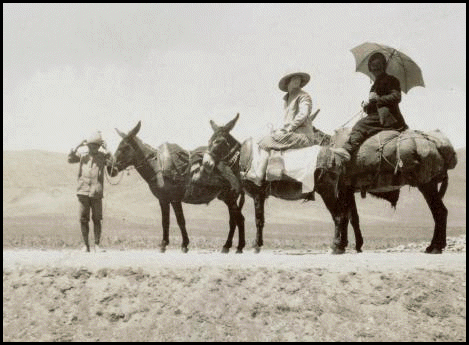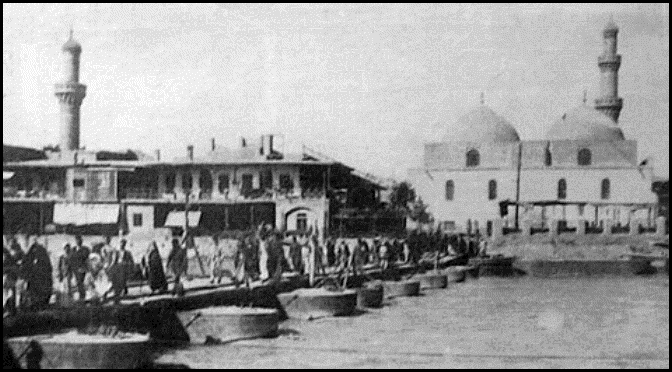
The shahtur came stranding downstream beside us, like a large punt. The sheep huddled out while our car clanked on; the donkeys, the woman, two peasants and ourselves settled round it; and the men of Balad, pulling from the prow, sang as they rowed.
"We poured out to our enemies death" (murr, they called it, bitterness).
"We poured out to our enemies death." The pull came with the final word.
The master of the shahtur gave a new verse:
"The Turkish bullet flies fast." With the sixth verse we neared the opposite bank. The waiting woolly mass of sheep rolled towards us; their shepherds made gurgling noises to ask them to wait till we landed: and in less than half an hour over the flat East-Tigris lands, we had Samarra and its golden dome in sight.
It is the most Arab and least Persian of the four Holy Cities, enclosed in walls in an arid belt of ruins that overhang on a low cliff the garden oasis of riverlands below. It is clean and friendly and, completely surrounded and much used by the nomads, has lost some of that misanthropic feeling towards the outer world characteristic of Iraqi towns, the result of many vicissitudes, mostly unpleasant.
Samarra had one brief period of splendour, of less than fifty years: eight caliphs built or beautified successive palaces; and the stuccos, unique and lovely, with which they wainscoted their rooms are now being gradually unearthed to adorn the new Arab museum in Baghdad.
There is no European in the town, but three Iraqi archaeologists were furthering the work of culture on their own with a zest and enthusiasm delightful to anyone except possibly the pedantically trained expert. We found them charming. What more fascinating game than to be given a city of ruins twenty-eight miles long to play about with and a little money to do it? They had unearthed the base of the cone-shaped tower and their men were crawling up like caterpillars in long lines, renovating the spiral staircase to the top. They had propped the outer walls of the great mosque beside it, and took us wandering through the latest of their palaces, with the stuccos still in position round the labyrinth of rooms. Here we paused, to discuss with the workmen where the next site should be, in a friendly vociferous manner which made one think of the arguments of Odysseus with his crew.
